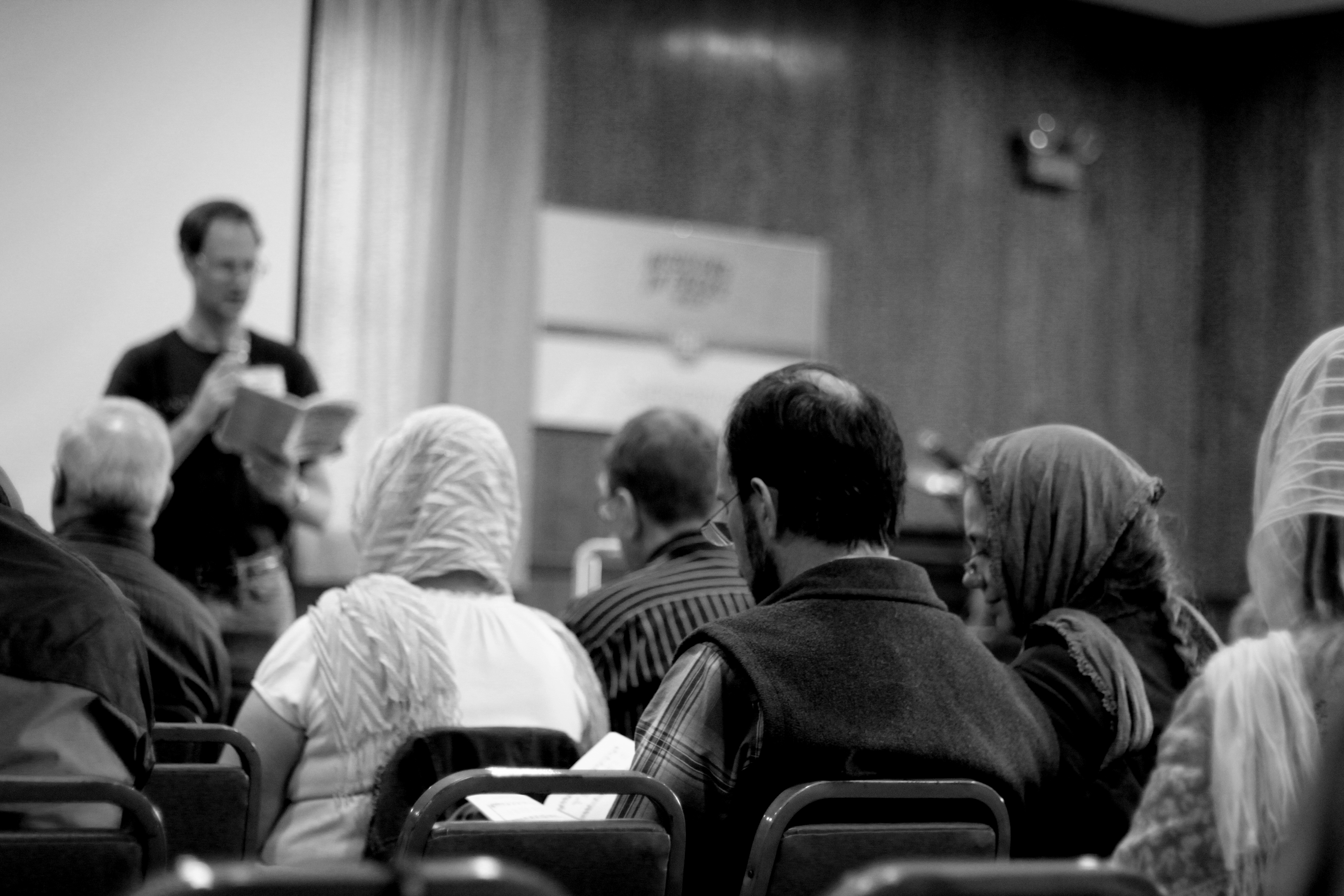The Development of Evil: "The Mystery of Iniquity" 2 Thessalonians 2

We hardly need to be reminded that iniquity is at work in the universe, but we do need to face it since it has affected us as well as the world around us. We may profit from a consideration of its commencement, its development, and its end, as scripture refers to these matters, for our encouragement, as those who have experienced its effects in our own lives, and who have seen desolation in the lives of other men.
- Sin was introduced into the universe by Satan. There should be no doubt of this in our minds. The Lord Jesus said of him that he was a murderer from the beginning, (or, the outset), and that he is a liar, and the father of it; i.e. its source (Jn. 8:44). The apostle John writes; “The devil sinneth from the beginning” (1 Jn. 3:8). Iniquity began its awesome career of damage, destruction, and death in his person. It is usually assumed that Satan was the highest created being, the passages in Isaiah 14 and Ezekiel 28 being thought to refer to him. If this is so, the outset of iniquity affirms that very sad truth that the greatest privilege does not save from the most disastrous fall. The two passages referred to would put this angel at the peak of created intelligences. Though some of the language is mysterious or even obscure, as we read it we have the impression that this is a word-portrait of an immensely favored and supremely intelligent being. Yet he sinned. We are left in no obscurity about the character of his wrong-doing. Solomon lists seven things which the Lord hates, and the first two are distinctly of Satan: “a proud look and a lying tongue” (Pro. 6:17). In Isaiah 12, the person described is heard to say, “I will ascend into heaven, I will exalt my throne above the stars of God…I will be like the Most High.” Such pride would be bound to lead to trouble. The repeated assertion of his own will (“I will” is said 5 times) emphasizes the speaker’s determination to do his own will and not God’s. In the parallel passage in Ezekiel 28, we see that the person written of there was also haughty in spirit, and said, “I am God; I sit in the seat of God.” He said so because his heart was “lifted up” (v. 17). All combined to inflate his opinion of himself and cause him to sin so grievously before the Lord. The consequence of such self-exaltation was that he was cast down from the dizzy eminence to which he had aspired (Isa. 14:15; Ezk. 28:8, 16, 17). “Pride goeth before destruction, and a haughty spirit before a fall,” is a truth which Satan had not learned, but which we would do well to notice (see Pro. 16:18).
- It seems certain that when the devil rebelled he dragged armies of celestial beings with him in his fall (2 Pet. 2:4). We are given scarcely any information about these rebel angels or of their revolt against the authority of the Almighty Lord. However, we are given some details concerning the malevolent enemy of God and his attempts to seduce men from allegiance to God. It must be assumed that since he fell, irrecoverably, he determined to do all in his power to damage or destroy what God was working out. His astuteness is unquestionable, and in his assault on the first pair, the weapon he used was the very temptation which had brought about his own ruin; that is pride and ambition. He had wanted to be as God, equal to the Most High. He had said, “I will ascend.” He lied to the woman and suggested that if they ate of the fruit which the Lord God had prohibited they would become as gods; it will open your eyes to new vistas, you will know good and evil. So she took of the fruit and ate, and she offered it to her husband and he also ate of it, thus permitting iniquity to gain an entrance into the human race. Satan and his armies of evil spirits had been cast down; now Adam and his wife, fallen from their innocent estate, were driven out of Eden into the great world to begin their struggle for existence against the forces of evil ranged against them. But they were not left on their own; God had provided a way of blessing even for them, which Abel took in faith, and was eternally blessed.
- Outside the protective seclusion of Eden, human life began in a sinful society. Means of having harmonious relations with God had been provided; God had clothed our first parents with coats of a skin and it is clear that Abel knew of a means of approach to God by an acceptable offering. However, very soon evil began to make its presence felt among men. False worship, murder, robbery, violence and corruption filled the lives of men. The whole range of man’s ideas, the whole character of his ways, the whole time of his life was filled with evil (Gen. 6:5). The pride of men was asserted in that they did what they chose to do without reference to the will of God (Gen. 6:2). The men were big in their own sight and stood to their own reputation (Gen. 6:4). It was in days such as those that Enoch walked with God. Very likely he trod a lonely path, for the mass of mankind, it seems, were bent on doing their own will. In time God swept away this society by a flood, with the exception of Noah and his family.
- In spite of the devastation of the world by the deluge, immediately afterwards evil began to spread rapidly among men. Paul’s first chapter to the Romans may give us some idea of the kind of world it speedily became. Men were willful, immoral, murderous and malignant. Every kind of iniquity was practiced and, as Scripture says, it filled their lives and their thoughts. It was evidently in this period that any pretence of piety was abandoned and idolatry was introduced; at any rate it is not mentioned before the flood. So God called Abraham out of the society of the day to be His worshipper and to be a witness in an impious world. But sin soon came into the Hebrew society, and instead of the nation being a witness for God, the Lord’s name was evil spoken of because of their wicked behavior. So the nation was judged and their territory reduced. The commonwealth was split into two nations, then one was deported and the remainder at a later date. This was followed eventually by universal dispersion. The people who had been lifted up so high were brought down in shame.
- The descent of the Holy Spirit to baptize the believers into one body and to link them with their ascended Lord may be thought to guarantee the maintenance of right conditions and preserve the church from any decline into evil. It has, however, been remarked that all the inspired writers of New Testament epistles, with the exception of James, affirm that there would be departure from the truth and some write of the great iniquities which are to arise during end times. So it is not surprising that not long after the formation of the earliest of the assemblies, evil began to enter. The history of the church, outwardly, had been a succession of failures and disasters, of divisions and of wickedness. The Revelation gives us, in chapters 2 and 3, a succinct account of the progress of evil, and its final phase as developed in Laodicea is appalling. The assembly has been so poor a witness that the Lord removed the lampstand of the earliest of its phases, and the final assembly of the seven is so nauseating to the Lord that He will spue it out of His mouth. It could be said, therefore, also of Laodicea, “How art thou fallen!”
- Meanwhile iniquity goes on developing in the world, recently at such an alarming rate that even the godless are dismayed by it. We are aware of this and do not need to be reminded of it; it is there before our eyes in all its boldness. Impiety and impurity abound in literature, in the press, in broadcasting, and in men’s lives in general and the accelerating tide of evil grows apace. The presence of the church, even in its broken and feeble condition, represents a dam which holds back, to some degree, the rising tide of iniquity. The Holy Spirit, though often grieved and quenched, indwells believers and dwells in the assembly. When the assembly is ruptured and the Holy Spirit ceases to abide on earth, the dam being removed, iniquity unleashed will sweep the world. The mystery of iniquity which has been working secretly for so many centuries will explode into open and violent activity and the condition of the world, bad though it is now, will be vastly more iniquitous. Men will openly blaspheme God, and a man will assume divine honors and demand human worship as though he were God. The consequences of all this wickedness in the world are unthinkable. The Lord Jesus will bring it all to a sudden end by the glory of His appearing, and evil with its iniquitous leaders will be put down.
- The period following the suppression of evil will be one of universal blessing. The Lord’s kingdom will be inaugurated, and a thousand years of peace, prosperity and plenty will ensue. It may be imagined that this wonderful “Utopian” period will effect a change in man’s nature and that, at last, he will have learnt the lessons which so many generations failed to learn; that he will see that sin is deadly, and that he will give it up. Nothing of the kind will happen. At the end of the millennium, as we call it, the Lord will release Satan from his prison and he, as malevolent as ever, will insinuate his evil lies into the thinking of the men of that time, and once more a multitude of men, untaught by the blessings of a thousand years of divine rule, will rebel against the Lord and will try, yet again to shut the Creator out of His own creation and will seek to establish their own will. This outburst of iniquity will also, thanks be to God, be subdued, and a final judgment session will decide the fate of all who have refused to submit to the rule of God. These will be committed to their final state and their iniquity with them, and all will be confined, eternally, in the lake of fire.
The blessed truth for us is that the Lord Jesus bore our sins in His own body on the tree. The Lord “laid on Him the iniquity of us all.” We shall not have to answer eternally, in a place of torment, for our sins because He answered for them, on our behalf, at that place of immeasurable suffering, Calvary.





